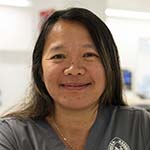The ACI’s Intensive Care NSW Network (ICNSW) is made up of five advisory groups and an Executive Committee, supporting intensive care clinicians across NSW and the ACT. The network’s Clinical Director and Co-Chair of the Nurse Leaders Group share their insights on running an engaged network in a demanding area of health, where clinicians often care for the sickest and most vulnerable patients.
First established in 2013, the Intensive Care Services Network became ICNSW in 2016. The Intensive Care Community of Practice (CoP) followed in 2020 as part of NSW Health’s COVID-19 pandemic response.
Network Clinical Director and Nurse Leaders Group Co-Chair

Dr Nhi Nguyen, Clinical Director
Intensive Care Staff Specialist
Nepean Hospital (Nepean Blue Mountains Local Health District)

Katina Skylas, Nurse Leaders Group* Co-Chair
Clinical Nurse Consultant
Concord Intensive Care (Sydney Local Health District)
*ICNSW has five advisory groups with 10 co-chairs.
What is the primary purpose of ICNSW?
The network allows intensive care clinicians to partner with key stakeholders to:
- lead and support innovation
- ensure intensive care in NSW has adequate capacity
- provide health outcomes that are important to patients and their families
- ensure people have timely access to quality intensive care, no matter where they live.
Tell us about your network members and what expertise they bring?
“ICNSW and the community of practice has more than 270 members. We have representation from every adult and paediatric intensive care unit in NSW and ACT,” says Dr Nguyen.
“Our members bring nursing, medical and allied health expertise; as well as health management expertise from local health districts and speciality health networks.”
What is your role as co-chair of the ICNSW Nurse Leaders Group, and what is most important to you?
“Intensive care nurse leaders from across NSW come together at our meetings and forums to collaborate on projects that place patients and their families at the centre of ICNSW’s work to innovate intensive care. As a co-chair, I support the network by facilitating meetings and forums that are relevant, engaging and collegial,” Katina Skylas explains.
“I am extremely passionate about intensive care nursing. It is a privilege to be involved with many amazing nurse leaders across the state who are developing and enriching intensive care nursing.
“The care we deliver is often to the sickest and most vulnerable patients in the hospital. Playing a key role in improving the care they receive is very rewarding.”
How do you foster collaboration with other organisations across health and other clinical networks?
“Membership across the Nurse Leaders Group is diverse. We represent the paediatric, adult, rural, regional and metropolitan intensive care units. We also have representatives from the Clinical Excellence Commission and Australian College of Critical Care Nurses,” says Ms Skylas.
“Our group feeds up to the ICNSW Executive Committee. Through this committee we can reach and collaborate with other clinical networks and health organisations.”
What are some key achievements of the network?
“A professional development project created a standardised framework for intensive care nurses in NSW. The project illustrated career pathways and progression in intensive care units, to support workforce sustainability and promote a supportive and nurturing nursing workforce culture,” explains Dr Nguyen.
“We have also worked with key stakeholders to develop a suite of resources to support the delivery of highly-specialised extracorporeal membrane oxygenation (ECMO) services in NSW.
“ECMO is a modified heart-lung machine that provides lung and/or heart support in patients with extreme organ dysfunction, where conventional support strategies don’t work.
"We used a collaborative approach and engaged with clinicians to provide expert advice to create a model of care, and other resources.
“The model is being used by the Sydney Children’s Health Network to develop a service for paediatric and neonatal patients, fulfilling a need for a coordinated service for these critically ill children.”
Find out more about the ECMO project and access the resources.
How do you encourage stakeholders to join the network?
“Members join by being nominated or responding to expression of interest communications sent to the intensive care units, encouraging staff to join specific ICNSW working groups. Leaders in the units also encourage staff to join. We often receive requests to join from clinicians who have heard about the community of practice and want to remain informed,” explains Ms Skylas.
“Each group has different membership requirements. For example, the Nurse Leaders Group is open to any nurse leaders in NSW and ACT that hold a manager, leadership or senior position in an intensive care unit.”
How do you keep your members actively engaged in network activities?
- Regular meetings are essential to maintain communication and contact with each another and keep projects on track.
- Creating an inclusive environment during meetings helps clinicians feel safe to raise issues and concerns, and to seek support and advice from the group.
- The Nurse Leader’s Group periodically runs planning sessions, to include members in developing and prioritising projects. This helps members actively engage and invest in projects, and puts the focus on working collectively to deliver beneficial outcomes.
What are your tips for leading an effective clinical network or group; particularly operating in a virtual environment?
- Regular, collegial and supportive meetings are a must.
- Establish mutual goals and projects, to allow the network or working group to remain effective and relevant.
- As a network with statewide membership, we are quite used to meeting virtually, but it has been challenging. Due to the pandemic, more of our members now have access to cameras, so our meetings have improved because we can see each other.
What are your key focus areas for the next year?
ICNSW is focusing on:
- developing a monitoring framework, to provide routinely collected data to frontline staff in a format that’s relevant to them
- using clinical analytics, data and engagement with clinical variation in pathology testing through the Atlas of Variation Pathology
- revising and enhancing the Intensive Care Nursing Transition to Practice course on My Health Learning.